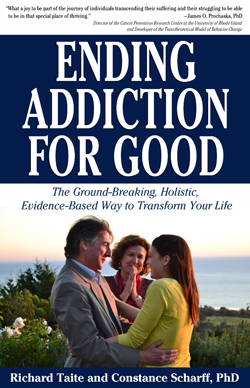|
|
|
Ending Addiction for Good
by Constance Scharff, PhD • California
 Is there any family in this country that is not affected in some way by addiction? If not you or your child or your parent, you likely have a brother, an aunt, a grandparent, a niece, a co-worker, an employee, or a friend who suffers from addiction. And make no mistake, addicts suffer. They use substances and behaviors to cover pain or trauma that they are ill-equipped to deal with. In doing so, they wreak havoc on the lives of everyone around them, especially the people who love them most. The sad truth is that few addicts recover. Most die terrible deaths leaving behind a family that will never be whole again. Fortunately, new addiction treatments are emerging that focus on the whole person – body, mind and spirit – in ways that past programs have not done. Such treatments are breathing new hope into the addiction treatment industry. Is there any family in this country that is not affected in some way by addiction? If not you or your child or your parent, you likely have a brother, an aunt, a grandparent, a niece, a co-worker, an employee, or a friend who suffers from addiction. And make no mistake, addicts suffer. They use substances and behaviors to cover pain or trauma that they are ill-equipped to deal with. In doing so, they wreak havoc on the lives of everyone around them, especially the people who love them most. The sad truth is that few addicts recover. Most die terrible deaths leaving behind a family that will never be whole again. Fortunately, new addiction treatments are emerging that focus on the whole person – body, mind and spirit – in ways that past programs have not done. Such treatments are breathing new hope into the addiction treatment industry.
Treating Addiction Holistically
Addiction is best treated when addicts are helped at the levels of mind, body, and spirit. However, this type of multi-faceted therapy is not the norm in the addiction treatment industry. Most recovery programs are 12-step based, meaning they focus on a spiritual solution to addiction. The addict must admit powerlessness and participate in a series of exercises intended to humble him and develop a calmness of spirit. These are all important activities, but they are not designed to expose and help the addict work through the root causes of his addiction. Very few treatment centers take a truly holistic approach to addiction treatment. Failure to do so keeps addicts from having the tools they need to recover.
Holistic addiction treatment recognizes that a person must be nurtured and supported at every level in order to heal. This makes sense in that addiction damages the addict on every level. Total healing has a greater chance to occur when the addict receives broad-ranging support in the form of proper nutrition, exercise, orthomolecular therapy and other treatments to support his body. He needs intensive, personalized psychotherapy to help him understand and overcome the underlying causes of addiction. The addict also needs support finding a spiritual path, be it through 12-step programs, meditation, yoga, or a particular religious tradition that will nurture and develop his spirit. All of these therapies must come together as needed by the individual. When that occurs, they combine synergistically to transform the addict’s entire life.
Intensive Individual Psychotherapy and the Stages of Change
Because the 12-step model is relied upon so heavily in treatment, not all treatment centers emphasize individualized psychotherapy. This failure can undermine an addict’s recovery. Addicts need to be met at their level of individual readiness to change, so that they can apprehend and overcome the causes of their addiction and use other concurrent therapies to greater effect.
Individualized, intensive psychotherapy helps an addict comprehend and overcome the specific reasons he began to abuse substances. Addicts use because they are in pain. They may have suffered a trauma such as childhood abuse, a terrible accident, or war-related trauma. Alternatively, the addict could be in pain from being bullied, neglected, unaccepted for his sexual orientation, lack of companionship or intimate relationships, or simply not having his basic needs met. Resolving the root causes of addiction is how the addict comes to live a life of purpose and joy. Without addressing these issues, the addict will likely relapse. This is why most treatment centers and 12-step programs have such low success rates – they don’t help the addict to overcome the pain and trauma that triggered the addiction in the first place.
Not all addicts arrive at treatment ready or willing to change. Some addicts are in denial. Others are so demoralized by their addiction they have given up all hope. However, what the evidence-base shows is that change occurs through a particular process. This process, and the tools to help addicts through the various phases of change, was described by Drs. Prochaska, Norcross and DiClemente in the 1990s. They called their model “The Stages of Change.” These psychologists suggest that when carefully moved through the Stages of Change, addicts will recover, because they are given the specific support they need at each stage to help prevent relapse. That theory and the tools described therein has now been used for several years in a clinical setting with outstanding results.
There Is Hope
The key to long-term addiction recovery for most individuals is to provide comprehensive, holistic treatment that addresses mind-body-and spirit while simultaneously supporting the addict and moving him gently through the Stages of Change, giving him time, space, and encouragement in addressing the deep psychological pain or trauma that began his plunge into substance abuse.
 Constance Scharff has a Ph.D. in Transformative Studies, specializing in addiction recovery. She is the Addiction Researcher and Transformative Studies Scholar at Cliffside Malibu Treatment Center and coauthor with Richard Taite of Ending Addiction for Good: The Groundbreaking, Holistic, Evidence-Based Way to Transform Your Life. Dr. Scharff writes for a variety of journals and speaks to healing professionals about addiction and recovery. For more information, visit www.endingaddictionforgood.com. Constance Scharff has a Ph.D. in Transformative Studies, specializing in addiction recovery. She is the Addiction Researcher and Transformative Studies Scholar at Cliffside Malibu Treatment Center and coauthor with Richard Taite of Ending Addiction for Good: The Groundbreaking, Holistic, Evidence-Based Way to Transform Your Life. Dr. Scharff writes for a variety of journals and speaks to healing professionals about addiction and recovery. For more information, visit www.endingaddictionforgood.com.
|

